
In an interview with Médiapart, Camille Salesse, a doctoral student at the CEE-M, talks about the study he conducted, recently published in the CEE-M working paper series:
‘Camille Salesse, a doctoral student at the Centre d’économie de l’environnement in Montpellier, is preparing to publish in an academic journal an assessment of the effect of extreme temperatures on mortality for the period from 1980 to 2019. Her research, which uses tools derived from economic statistics, reveals just how far behind France is in adapting to climate disruption’.
In this study, Camille shows that large cities are more affected, due to the concentration of buildings, materials such as concrete and the lack of green spaces, which encourage the formation of heat islands, and atmospheric pollutants, which exacerbate the effects of heatwaves. This phenomenon is exacerbated by the greater presence of a more precarious population living in poorly insulated housing.
Camille also looks at the strategies that need to be put in place: ‘transforming densely populated cities by making them greener, insulating homes better, reducing atmospheric pollution and urbanising in such a way as to limit the formation of heat islands’. But we must also ensure that the most vulnerable people, the elderly and those on low incomes, have ‘guaranteed access to air conditioning’, while recommending that we ‘reduce our greenhouse gas emissions, which will automatically reduce the frequency and intensity of heatwaves’
Read the interview >>> (subscribers only))
